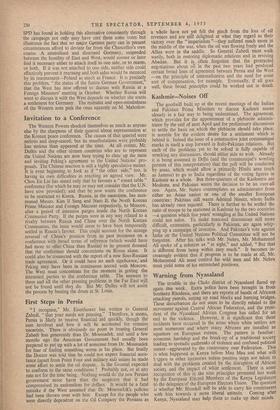Kashmir—Noises Off
The goodwill built up at the recent meetings of the Indian and Pakistan Prime Ministers to discuss Kashmir seems already in a fair way to being undermined. The agreement, which provides for the appointment of a plebiscite adminis- trator by the end of next April and for preliminary discussions to settle the basis 'on which the plebiscite should take place, is notable for the evident desire for a settlement which is behind it. Indeed the issue of a constructive joint communiqué marks in itself a step forward in Indo-Pakistan relations. But each of the problems yet to be solved is fully capable of wrecking any discussions, should either side so wish. Already it is being assumed in Delhi (and the communiques wording permits of this interpretation) that the poll will be conducted by areas, which would allow a primarily Hindu area (such as Jammu) to go to 'India regardleSs of the voting figures in Kashmir as a whole. But three-quarters of the Kashmiris are Moslems, and Pakistan wants the decision to be an over-all one. Again, Mr. Nehru contemplates an administrator from either an Asian nation or one of the smaller European countries: Pakistan still wants Admiral Nimitz, whom India has already once rejected. There is further to be settled the ratio of troops to be stationed in Kashmir by the two countries —a question which five years' wrangling at the United Nations could not solve. To make reasoned discussions still more difficult, extremists, particularly in Pakistan, are again whip- ping up a campaign Of invective. And Pakistan's vote against India on the United Nations Political Committee will not be forgotten. After his talks with Mr. Nehru, Mr. Mohammed Ali spoke of a solution as " in sight," and added, " But that is different from being within easy reach." It becomes in- creasingly evident that if progress is to be made at all, Mr. Mohammed Ali must control his wild men and Mr. Nehru must yield some of his entrenched positions.


































 Previous page
Previous page